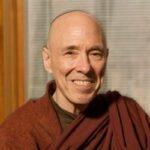Many years ago, when I was a newly ordained monk in Sri Lanka, I decided to “moisten” my daily practice of mindfulness of breathing with metta, the meditative cultivation of loving-kindness. For guidance, I turned to the instructions in the Visuddhimagga, the classic Theravada treatise on Buddhist doctrine and meditation. The Visuddhimagga explains that, in the initial stage, loving-kindness is to be developed toward people in four groups: oneself, dear people, neutral people, and foes.
Following the guidelines laid down in the treatise, I began by taking myself as the first recipient of metta, directing toward myself the thoughts: “May I be well, happy, peaceful, and safe!” I next turned to several people in the second category, “those who are dear,” and found that, after a few fits and starts, loving-kindness flowed smoothly toward people in this group. Next came the third category, the “neutral people,” mere acquaintances toward whom one’s feelings are neither friendly nor hostile. When I tried to direct loving-kindness toward people in this category, the flow of empathy dried up, and my mind became dry and listless. I persisted in my efforts but instead of launching out upon the open sea of loving-kindness, I found myself sinking in the sand dunes of dullness and apathy.
One day, however, a shift took place that transformed my practice. The shift occurred spontaneously and inexplicably, without deliberate effort on my part. Up to this point, I had been mentally visualizing the people toward whom I had been trying to develop loving-kindness, taking them, in my mind’s eye, as the objects of my meditation. The key event that triggered the shift was the realization that these people were not “objects” at all but subjects—irreducible centers of experience. It dawned on me that these people did not merely exist “out there” in the objective space of my own awareness, but were each the nucleus of an expanse of experience unique to themselves. Each was an irreplaceable subject, persons with their own stories, their own interiority, their own hopes and fears, their own complex web of relationships, aspirations, and concerns.
“Every person, every being, even a fly, is a unique perspective from which the universe experiences itself, a beam of light through which the universe bears witness to itself.”
With this shift, the recognition hit me that, as subjects of experience, each of these persons was impelled by the primary aims that motivate all subjects of experience: to avoid suffering and achieve happiness, to escape harm and dwell in peace, to live a life of meaning, purpose, and fulfillment. At once, a deep wave of empathy swelled up in my heart, rooted in the recognition of our shared humanity, our shared sentience. This does not mean that my cultivation of loving-kindness toward the neutral and hostile people immediately became effortless and spontaneous. I still had to make a determined effort to apply the empathy that arose to the task of generating and sustaining loving-kindness toward the people I placed in those categories. But I had found the key to unlocking the door, the means to extend the feeling of loving-kindness toward those people I had previously viewed as mere impersonal entities.
It didn’t take me long to realize that this discovery had a far-reaching implication. From the recognition of the indisputable subjective reality of the people I was mentally conjuring up in my meditation, I came to see that every person is at base a subject of experience. This truth can even be extended to all sentient beings, to the understanding that birds and bats, spiders and flies, are also centers of awareness actively engaged in the project of carving out a space for themselves in the world. But my primary concern here is with the type of being with whom we can most easily identify, that is, our fellow human beings.
As a subject of experience, I realized, every person is the center of a world. From the core of every person, a world opens up and expands outward to infinity and inward to a bottomless depth. Every person, every being, every center of consciousness reflects the entire universe, and the entire universe converges upon and embeds itself within every person and every being. Every person, every being, even a fly, is a unique perspective from which the universe experiences itself, a beam of light through which the universe bears witness to itself.
Subjective experience collapses distances of space and time. I look out at the sky at night and see stars and galaxies light years away. You look out at the sky at night and you too see stars and galaxies light years away. All those stars and galaxies are present for me, converge upon my consciousness; and they are also present for you, converge upon your consciousness. Each moment of my awareness contains the experience of countless generations of living beings. And so for all of us. Each of our present thoughts and actions contains the beginningless past, and each thought and action radiates outward endlessly toward a future we can never fully foresee.
This line of reflection led me to understand that since every person stands at the center of the world—at the center of their world—every person’s life is endowed with intrinsic value, with a value that can never be erased, can never be obliterated in the name of any cause, no matter how exalted. A person can never be reduced to a bearer of mere instrumental value. As centers of experience, people are ends in themselves, not means to some other end.
As I pursued this line of reflection, I recognized that all persons, as subjects endowed with innate value, are entitled to the things they need to flourish, the things they need to transform their primordially given value into realized living value. We actualize concrete living value by living in a way that enables us to achieve our potential for meaning. A life without meaning is a futile life, an empty life, a pointless life. Human beings are not driven merely by blind instincts—to eat, indulge their desires, and reproduce—but seek to impart meaning to their lives, to live with purpose. The purposes we set for ourselves may be worthy or worthless, admirable or reprehensible, but the quest for meaning is inscribed in the very code of our consciousness.
The recognition that we, as individuals, are each a center of subject experience has a corollary. This is the fact that our subjectivities intersect. Although I am the center of my universe, and you are the center of your universe, and those people over there are each the center of their universes, these universes are not closed off from one another and folded in upon themselves. Rather, they are interwoven; they penetrate each other and reflect each other. The multiple spaces of subjectivity constitute a unified field. We occupy a shared space in which, as subjective beings, we look one another in the face, and looking at the face of another opens their universe to our own vision and invites us to enter and dwell within it.
It is from this encounter with the other, with other persons and the other universes constituted by their subjective spaces, that empathy can swell up and be transformed into compassion. Compassion is what makes the heart shake with the suffering of others. To see others as subjects is to open one’s heart to their needs, to recognize their suffering, to hear their call for help, and to respond in the way that best suits the situation. The active expression of empathy is what I call “conscientious compassion,” the heartfelt commitment to reduce the suffering of others, contribute to their well-being, and strive to create a world conducive to human flourishing.
When we cast our eyes out upon the world, we can see that the overwhelming majority of people who share this planet with us pass their lives under conditions that crush their quest for optimal meaning. Sadly, even tragically, the forces that govern their lives condemn them to a relentless struggle merely to subsist. Too many hover at the edge of unspeakable misery, weighed down by poverty, compelled to work long hours for mere survival wages, subject to the whims of others who often show them no mercy at all. They are treated not as subjects but as objects, not as ends in themselves, but as mere means to the self-seeking purposes of others.
Among the harshest fates that any person can face is chronic hunger. Whether it’s imposed by famines, war, or endemic poverty, hunger erodes your sense of your own innate worth. Hunger condemns you to a relentless quest for food, a quest that has to be renewed each day, always with the threat of more severe hunger lurking just around the corner. When you are in the grip of hunger, life loses all purpose but the one compelling need: to eat, and to obtain food for those who depend on you. The one thing that brings a fleeting satisfaction is an adequate meal. The one thing that brings a plunge into despondency is the realization that, once the meal is finished, your search for food must begin again.
In 2008, when I founded the organization Buddhist Global Relief, we chose as our mission the task of combating chronic hunger and malnutrition. We began with a narrow focus: providing direct food aid to those suffering from persistent hunger. But as our work expanded our mission, too, widened. We came to understand more clearly the underlying roots of chronic hunger: war, poverty, climate calamities, and the subordinate status of women and girls that prevails in many cultures. While we could do little directly to terminate wars, our projects came to tackle the other roots of chronic hunger. We now support close to sixty projects around the world, many providing girls the chance to attend school, women the resources to start right livelihood projects, and small-scale farmers training in ecologically sustainable agriculture.
We see our work not merely as an expression of charity or a humanitarian undertaking — though it may well be described in such terms — but as a bold affirmation of the intrinsic dignity of every human being. When we provide people with life-sustaining food — or even better, with the chance to emerge from poverty and earn a living on their own — we are acting from a recognition of our inextricable connection with others, from the resonance between our subjective being and their subjective reality.
To rescue a single life is to rescue a single subject, and thereby to preserve a single world, to sustain a single universe. To rescue many lives from the chasm of hunger is to rescue many subjects, and thereby to preserve many worlds, many universes, each hosted by a unique being whose life is of inestimable value.
This article is available in Spanish in our section El Camino del Buda.
Este artículo está disponible en Español en nuestra sección El Camino del Buda.



